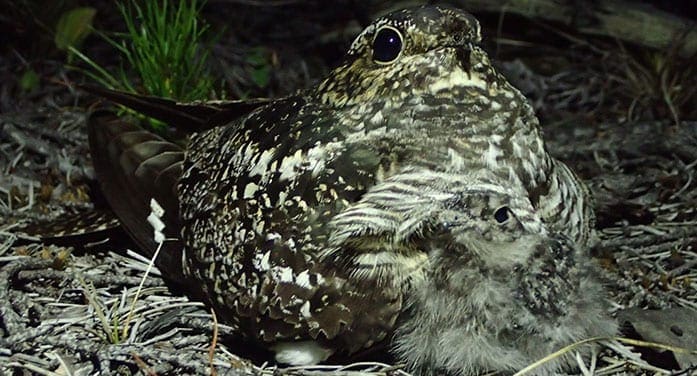Ten years ago, University of Alberta PhD candidate Elly Knight started a volunteer citizen science program. Since then, the Canadian Nightjar Survey has grown from a single volunteer in southern British Columbia to several hundred citizen scientists across the country – and more volunteers are needed.
Their mission?
To monitor the nightjars that breed in Canada. These fascinating, cryptic, nocturnal migratory birds are aerial insectivores, feeding on flying insects. Like many species that rely on a similar food source, nightjars are of conservation concern. In fact, this foraging group is declining faster than any other group of birds in Canada. And a lack of data is posing a challenge for conservation efforts for nightjar species.
In a recent study, Knight and her collaborators at Environment and Climate Change Canada showed that the Canadian Nightjar Survey is critical for understanding the population trends and habitat associations of the common nighthawk, a nightjar species that breeds all across Canada.
“Because these birds are nocturnal, they’re not well monitored by other surveys, and we don’t understand their population trends or ecology very well,” explained Knight, who is completing her PhD under the supervision of Erin Bayne, professor in the University of Alberta’s Department of Biological Sciences. “This lack of information is a barrier to effective conservation planning.”

A mother nightjar with her chick. U of A researcher Elly Knight is recruiting volunteer citizen scientists from across Canada to help provide information about the nocturnal migratory birds that will be critical to conservation efforts. (Photo: Elly Knight)
To remedy the situation, Knight developed a citizen science program in her spare time. Now, a decade since its inception, the Canadian Nightjar Survey has been adopted by Birds Canada, the country’s premier environmental non-governmental organization for bird conservation. The Canadian Nightjar Survey is also receiving funding from the federal government through Environment and Climate Change Canada.
“Birds Canada has the resources and expertise to make this project successful in the long-term,” said Knight of the project’s transition. “The Canadian Nightjar Survey allows volunteers to learn basic bird survey skills and collect valuable ecological data to contribute in a meaningful way to the conservation of these birds.
As spring arrives across the country, the Canadian Nightjar Survey could provide a great – and socially distant – distraction from the COVID-19 pandemic for ecology enthusiasts.
“Birding has become a popular pandemic pastime, and the Canadian Nightjar Survey offers new birders a chance to get directly involved in bird conservation,” said Andrew Coughlan, Quebec director and Canadian Nightjar Project lead for Birds Canada. “This program will play an important role in stemming the demise of these aerial insectivores.”
“This type of citizen science is something that can be done while social distancing,” noted Knight. “The surveys, which take two hours to complete, are done by one or two people in a car, stopping every 1.6 km on the side of the road in rural areas to listen for nightjars. It’s a great way to get out into nature at dusk, which is a really neat experience.”
The study, “Combination of targeted monitoring and Breeding Bird Survey data improves population trend estimation and species distribution modeling for the Common Nighthawk,” was published in Ornithological Applications.
| By Katie Willis
This article was submitted by the University of Alberta’s Folio online magazine. The University of Alberta is a Troy Media Editorial Content Provider Partner.
© Troy Media
Troy Media is an editorial content provider to media outlets and its own hosted community news outlets across Canada.

